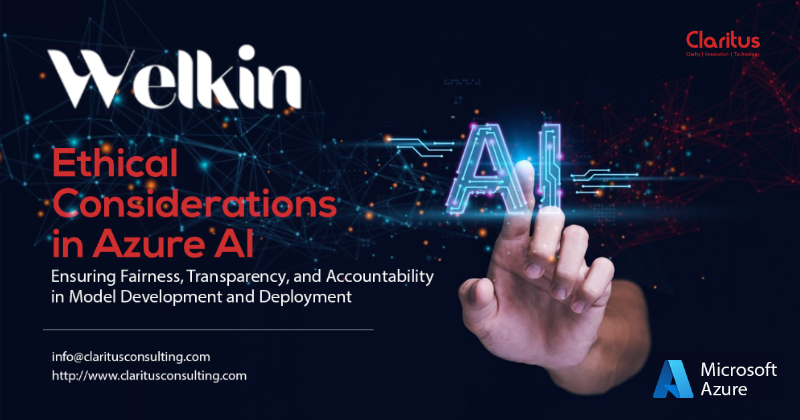Ethical Considerations in Azure AI
Ensuring Fairness, Transparency, and Accountability in Model Development and Deployment
The development of artificial intelligence (AI) is growing rapidly, revolutionizing industries and shaping a future that many of us could have never imagined. At the vanguard of this innovation is Microsoft Azure AI, a comprehensive suite of services that helps developers and organizations build, train, and deploy AI models at scale. While AI offers immense potential, it also raises significant ethical issues.
Ensuring fairness, transparency, and accountability in the development and deployment of AI models is not only a technical challenge but also a moral obligation. This blog explores these ethical considerations within Azure AI and how developers can navigate them to build responsible AI systems.
Unbiased AI: Striving for Fairness
One of the most pressing ethical issues in AI is fairness. AI models are trained on data, and sometimes, that data reflects societal biases. If these biases are not addressed, the models can perpetuate or even amplify them. For example, an AI model used in hiring processes could favor certain demographics over others if the training data is skewed.
Azure AI empowers developers with tools designed to detect and mitigate unfairness in AI models. By analyzing model predictions and comparing them across different demographic groups, developers can identify and address biases before deploying the model. However, fairness extends beyond technical aspects; it’s also about understanding the broader social implications of AI. Developers must ask themselves: Who might be disadvantaged by this model? Are we reinforcing existing inequalities? These questions are crucial in ensuring that AI systems benefit everyone, not just a select few.
Transparency: Bringing Clarity to AI Decisions
Transparency in AI refers to making the decision-making process of AI models understandable to humans. This is particularly important in high-stakes areas such as healthcare, finance, and law enforcement, where AI-driven decisions can have significant consequences.
Azure AI provides several tools to enhance transparency, including interpretability features that help developers understand how models arrive at their predictions. For example, the InterpretML package offers insights into which features are most influential in a model’s decision-making process. However, transparency is not just about understanding how a model works; it’s also about communicating that understanding to users and stakeholders. Developers should document their models, explaining the data used, the assumptions made, and the limitations of the model. This level of transparency helps build trust with users and ensures they can hold AI systems accountable.
Accountability: Who Is Responsible for AI Decisions?
Accountability in AI is a complex issue because it involves determining who is responsible when an AI system makes a mistake. Is it the developer who built the model, the organization that deployed it, or the AI itself? In reality, accountability must be shared across all these entities.
Azure AI promotes accountability through tools that enable continuous monitoring and auditing of AI models. By keeping track of model performance over time, organizations can detect and address issues before they cause harm. Additionally, developers should implement robust testing protocols to ensure that models behave as expected in real-world scenarios.
Another aspect of accountability is the ability to contest AI decisions. Users should have a clear avenue to challenge or appeal decisions made by AI, especially in areas like credit scoring, employment, and criminal justice. This requires not only technical solutions but also legal and regulatory frameworks that support accountability.
Privacy: Safeguarding User Data
The ethical considerations in Azure AI extend beyond fairness, transparency, and accountability. Privacy is another critical concern, especially as AI systems often require vast amounts of data to function effectively. In Azure AI, privacy is protected through features like differential privacy, which allows developers to build models without exposing individual data points.
Developers must be vigilant in protecting user data, ensuring that it is anonymized and stored securely. They should also be transparent with users about what data is being collected and how it will be used. By prioritizing privacy, developers can help build trust in AI systems and protect individuals’ rights in an increasingly data-driven world.
Balancing AI with Human Judgment: The Human Element
It’s important to remember that AI is not infallible. While Azure AI provides powerful tools for building advanced models, these models should complement rather than replace human judgment. In many cases, the best outcomes are achieved when AI and humans work together, each bringing their strengths to the table.
For example, in medical diagnostics, AI can assist doctors by highlighting patterns in data that may be difficult for humans to detect. However, the final decision should rest with the human expert, who can consider the broader context and ethical implications. This collaborative approach ensures that AI enhances human capabilities without undermining the importance of human judgment.
Ethical considerations in Azure AI are not just about avoiding harm; they are about actively promoting fairness, transparency, accountability, and privacy. By keeping these principles at the forefront of AI development, developers can build systems that not only push the boundaries of what is possible but also serve the greater good. As we continue to explore the potential of AI, it is crucial that we do so with a commitment to ethical responsibility, ensuring that the technology we create benefits all of humanity.
In the end, the promise of AI is not just about technological advancements but about creating a future where technology works in harmony with human values, ensuring that progress is inclusive, fair, and just.










